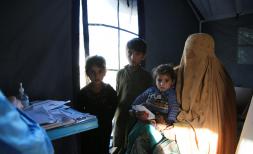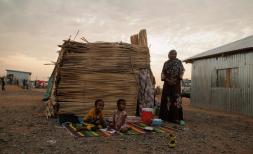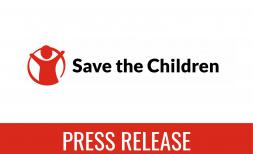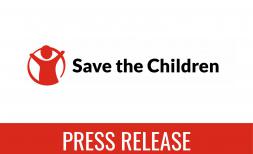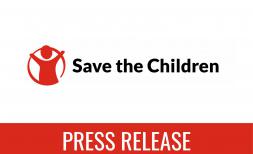Schools must be open, accessible and safe from attacks, say African children
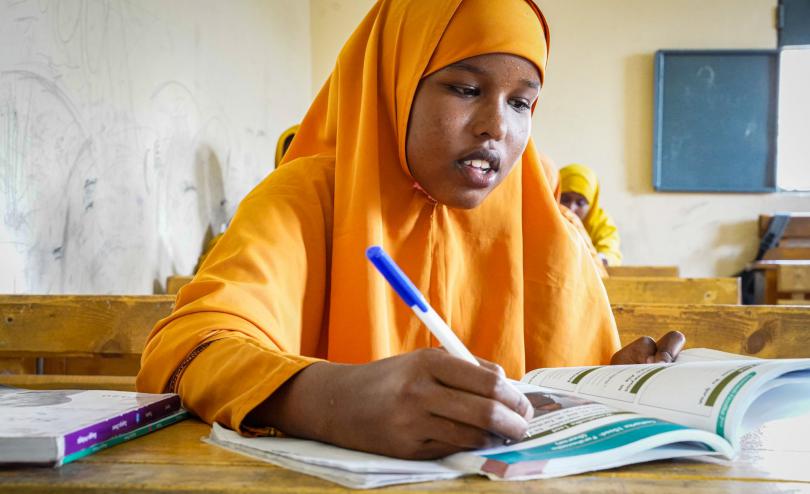
African children speak out about how the COVID-19 pandemic tipped an existing education safety crisis to breaking point
Nairobi, Kenya/Dakar, Senegal (June 16, 2021) – While the continent is celebrating Day of the African Child and the 30th anniversary of the African Charter on the Rights and Welfare of the Child (ACRWC), African children are sending a clear and urgent message to governments and donors: Save our Education and make schools safe.
Even before COVID-19 school closures hit, millions of children across Africa’s crisis and conflict-affected countries were losing out on education. Children in Sub-Saharan Africa have lost, on average, 69 days of education due to school closures and a lack of access to remote learning[i].
Now, during Save the Children’s campaign 100 Days of Action, thousands of African children used the days leading up to June 16 to speak about missing quality safe access to education due to factors like the global pandemic, unsafe schools, and discrimination against girls.
In Zambia, children are campaigning for more funding for their schooling, using radio and social media to ask for new schools and better sanitation and hygiene facilities to protect them from COVID-19. In Sudan, children led a campaign to interview power-holders, including the EU ambassador and the Minister of Social Development, to ask them how their education will be restored post-COVID-19. In Puntland, northern Somalia, child campaigners met with the Ministers of Education, Planning, and Social Affairs to ask them to prioritize education and to invest in children’s learning to tackle the impact of COVID-19 on education.
In Addis Ababa, Ethiopia, Yakob, 16, said: “COVID-19 had affected me in many ways. But the major problem I had during the COVID-19 school closure was depression. You can’t see your friends, go to school. Being cooped up in the house was really rough for me. What I want to achieve during this 100 Days of Action is be a voice for children. There are many children and youngsters in Ethiopia. I want to be their voice so that they’ll have a life that’s free from abuse, educated and a productive part of the society.”
In Mali, members of the children's parliament visited a displacement camp where 52 children live in a centre without any access to education, and called on national leaders, raising awareness of their situation and demanding the right to education for all Malian children. In DRC, nearly 100 girls from conflict-affected Bunia territory spoke about both progress and challenges in how they access safe education.
In Mali, Fatima, 15, Member of the national children's parliament in Mali, said: “Authorities, decision-makers and donors need, as first step, to find out what is really missing in the schools, and then provide a budget that can cover the needs. The education of children in conflict areas is disastrous. Imagine a child going to school and seeing it on fire! He will of course not want to go back, he will think that it’s not a safe place. And unfortunately, this exists in our country. All children have the right to a quality education. Let's commit ourselves so that tomorrow this right can be respected everywhere in the world.”
COVID-19 has exacerbated existing inequalities in school systems across Africa and has a catastrophic impact on the most vulnerable who do not have access to any form of social protection. While some schools across the continent have re-opened, many children remain at home due to conflict, climate shocks, or poverty. In southern Somalia, where schools have reopened, up to 73% of children have not returned to class[ii].
Between mid-2017 and mid-2019, the central Sahel countries of Burkina Faso, Mali, and Niger witnessed a six-fold increase in school closures due to attacks and insecurity. By the end of December 2020[iii] as the continent continues to respond to the health crisis, 3864 schools were closed in these countries as the result of conflict, with eight million children out of school and 19,000 teachers affected.
In Burkina Faso, Salimata*, in Grade 10, said: "I come from a village in the north of Burkina Faso. I’m the eldest of a family of five children. I came to Ouahigouya last year to save my life. In my village, all the classes are closed. Several times, we were visited by armed men who forced us to stop classes. This situation has disrupted my studies and I’m having difficulty catching up. ButI have faith in the future and I hope to succeed in life to help my family. "
In Somalia, more than three million children are out of school due to conflict and other crises[iv]. While the situation varies from country to country and between rural and urban areas, overall 56% of the out of school children are girls.
In Somalia, Farhiya*, 16, said: “When I grow up, I want to be a doctor, but I am worried about not completing my studies because of school closures and the pandemic. I have seen children dropping out of school because they have either lost their source of income and that their families cannot pay school fees, or because girls are married off during school closure.”
Eric Hazard, Save the Children’s Panafrican Campaign and Policy Director, said: “African children are demanding for more to be done to protect their education. The pandemic has shown that children’s education remains a tenuous priority for many African governments, with children losing months of education due to conflict, funding, and policy decisions.
“While we commend the African Union for progress made in meeting the ACRWC aspirations, and we know Governments are still dealing with the health crisis, we need education to be top of their agenda for a post COVID world. Before COVID-19, education budgets across the region were declining, and governments must not deprioritise it further when they have to make tough choices. It’s the right time to restore access to education for all and bring a specific attention to girls.”
Save the Children is also calling on African leaders to ensure that as they focus on their response to COVID-19, students and educational facilities are protected from attacks and from military use. Governments must invest more to transform their education systems and the future of Africa, which has the youngest population in the world. Despite progress across the continent, Sub-Saharan Africa is still home to the worst countries on earth to be a child. African governments need to recognize that school closures hit the most vulnerable children hardest, and adopt national plans to ensure they will support appropriate low-tech, inclusive, gender-responsive and affordable distance education methods where necessary.
Save the Children is also calling on those countries who have yet to sign onto the ACRWC to do so. 30 years after its adoption, 50 countries have ratified the ACRWC but five countries are yet to ratify, including Morocco, Somalia, South Sudan, and Tunisia. Save the Children encourages member states to report on the progress made in the implementation of the ACRWC consistently, and calls on Member states to effectively implement the Safe Schools Declaration, the Abuja Declaration commitments, and ensure that SDG 4 is implemented.
*name changed to protect identity
Notes to editors:
- The Day of the African Child was established in 1991, in memory of the 16th June 1976 student uprising in Soweto, South Africa. At that time, students marched in protest against the poor quality of education they received, and many of them lost their life during the protest. In 2021, the Day of the African Child will celebrate the 30th anniversary of the adoption of the African Charter on the Rights and Welfare of the Child. This celebration will focus on how individuals and governments can accelerate the implementation of Agenda 2040 for an Africa fit for children.
- The African Charter on the Rights and Welfare of the Child (ACRWC) was adopted by the Organisation of African Unity (OAU) in 1990 (in 2001, the OAU legally became the African Union) and was entered into force in 1999. Like the United Nations Convention on the Rights of the Child (CRC), the Children's Charter is a comprehensive instrument that sets out rights and defines universal principles and norms for the status of children. The ACRWC and the CRC are the only international and regional human rights treaties that cover the whole spectrum of civil, political, economic, social and cultural rights.
- You can find the content here: https://www.contenthubsavethechildren.org/Package/2O4C2SCAA66L
- For more information, contact Daphnee Cook, Daphnee.Cook@savethechildren.org or Florence Cisse, Florence.Cisse@savethechildren.org
[ii] Topline findings for POST-COVID-19 assessment on education, Jan 2021; the enrollment decrease severely affected Lower Juba(-73.7%) Lower Shabele (-38.4%), Nugal (-33.8%) and Banadir(-17.3%)
[iii] February 2021 - Education in Emergency working group in the Sahel dashboard.
